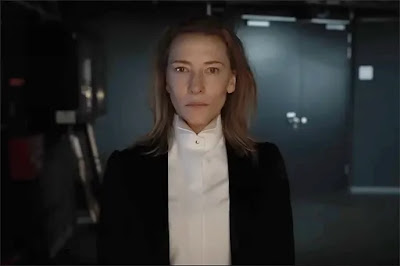Like the sleek Brutalist Berlin apartment of its eponymous orchestral conductor Lydia (Cate Blanchett) or the bravura sequence in which Lydia essentially outflanks a student in an auditorium classroom by moving from the stage to the seats so that rather than looking up at her pupil, she’s looking down on him, blocking as a pronouncement of authority, Todd Field’s “Tár” is meticulously composed, in its framing, its sound design, its acting. Especially its acting. This is why you cast Blanchett in such a role, the most meticulous of all modern performers, the most meticulously performative of all modern performers. She played Queen Elizabeth I, for God’s sake, which demands a performance, and as Lydia Tár, chief conductor of the Berlin Philharmonic, she is performing too, evincing someone who undoubtedly classifies herself as Royalty, waving away a wine glass at a lunch with such flourish she may as well be holding a conducting baton. In that scene, she is meeting with Eliot Kaplan (Mark Strong), the head of her fellowship program but also a wannabe conductor himself. Strong dons a wig that makes him appear disheveled, his unassertive posture mirroring his voice, the whole thing a precise juxtaposition to Blanchett’s air of regality. Her character doesn’t need to say this guy isn’t worth the gum on her hip to the tip chunky black shoes because her whole air says it for her.
“Tár” establishes this paramount sense of performance from the opening scene in which Lydia is interviewed at length by The New Yorker’s Adam Gopnik, playing himself. True, this sequence is technically an exposition dump, with Gopnik literally reading a loud Lydia’s myriad accomplishments (she’s an EGOT!) like he’s reading straight from Field’s preparatory character profile. But! Watch Blanchett here. Her mannerisms and line readings, nay, annunciations don’t sound simply rehearsed; they sound sculpted, chiseled, she’s Lydia Tár as a bust of Lydia Tár, EGOT, come to life, and larger than life. And as Gopnik reads aloud the character’s remarkable resume, Blanchett has Lydia virtually breathe in the fumes of Gopnik’s words to embody her triumphs as fuel. This is not mere ego, but something more, underlined in Lydia beseeching the need to sublimate not just one’s ego but their very identity. We don’t quite understand it yet, but Lydia has sublimated her own. When she accosts a student bullying her daughter, she comes across less like a mother (father) than a role-playing intimidator, relishing the part, putting into perspective the frigid, impersonal nature of her personal relationships even as her personal and professional relationships threaten to undermine her climactic recording of Mahler’s 5th Symphony.
Those personal and professional relationships, they touch on numerous topics, some timeless, some timely, from dreaded Cancel Culture™ to sexual power dynamics to just plain power. “Tár,” though, ultimately comes across less about a movie of any one idea than a sensation, an eerie and guttural one almost functioning as a kind of contrast against the lofty setting, and all brought about because of those personal and professional travails, triggering something like Lydia’s emotional and mental collapse. And it’s not just that Lydia is plagued by strange sounds and weird encounters and bizarre happenings, but that Field’s aesthetic grows more fragmented, elliptical, enigmatic. In their conversation, Gopnik deems Lydia a human metronome, the means of the orchestra keeping time, but she takes it further than that, suggesting she keeps time itself, underlined in Blanchett moving her hands as Lydia explains to appear as someone very much molding and shaping time in front of her. But as “Tár” progresses, its own sense of time unravels which is to say Lydia’s sense of time unravels, and the persona she has carefully calibrated begins to crack.
Given the topics Field employs to stoke his character’s downfall and the prevalent sense of ambiguity in his aesthetic, “Tár” has kicked up relentless fodder for the discourse, both on social media and more in-depth critiques. But it was the late Roger Ebert who noted the folly of plumbing the depths of Francis Ford Coppola’s “Apocalypse Now” in terms of its ideas. That quote came back to me not least because the denouement of “Tár” both explicitly and spiritually hearkens back to Francis Ford Coppola’s 1979 film, transcending commentary for something profoundly innate, the epilogue of Alexander Payne’s “Election” on acid, a character who goes to the ends of the earth to try and reclaim the humanity she buried beneath two tons of shits eons ago, only to come up with sand between her fingers.




No comments:
Post a Comment